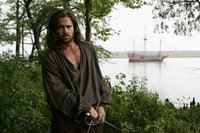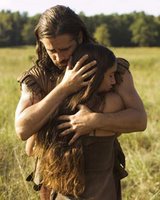 A visionary take on the story of John Smith and Pocahontas, Terrence Malick’s The New World is transcendent. It transcends the need for expositionary dialogue and traditional narrative laid out in parcels carefully dictated by the cookie-cutter script assemblers who write books on how to plan out a screenplay. Luscious and textured, the film lacks an orthodox narrative engine, and drifts from one scene to the next, much like the wind over the native grasses in some shots. Therein lies its strength and frustration.
A visionary take on the story of John Smith and Pocahontas, Terrence Malick’s The New World is transcendent. It transcends the need for expositionary dialogue and traditional narrative laid out in parcels carefully dictated by the cookie-cutter script assemblers who write books on how to plan out a screenplay. Luscious and textured, the film lacks an orthodox narrative engine, and drifts from one scene to the next, much like the wind over the native grasses in some shots. Therein lies its strength and frustration.Malick, however, is an artist, and there is much to admire. The New World effortlessly drops from the panoptic to the personal/psychological and dabbles in the interior of the characters for much of the film. Deeply meditative, the film considers the importance of humanity’s connection with the natural and spiritual. The natives, “naturals”, are entwined and sustained by nature, and thrive with colour and energy. The settlers, by implication the “unnaturals”, do not, and descend into decay, disease, and madness.

Captain John Smith (Colin Farrell) is a terse brute, seen in chains in his ship’s hold at the picture’s opening, reaching for the shafts of sunlight filtering down from the deck above. Reprieved by Captain Christopher Newport (Christopher Plummer), Smith journeys upriver to meet the naturals and has a second reprieve, this time from execution by the natives, their hands stayed by Pocahontas (Q'Orianka Kilcher, her character never actually referred to as Pocahontas). Their love, never directly consummated onscreen, unfolds in some strikingly beautiful and simple scenes, understated to the point that many mainstream moviegoers may begin to contemplate walking out.
Especially in the first half, the film has an aura of mystery, discovery, and authenticity that few historical films capture. The naturals and the settlers are mutually awed by each other and the land, and the details of the native culture and the English settlement are completely believable and often fascinating. Unfortunately, the last third of the film tends to plod along, though when Pocahontas travels to England with Opechancanough (Wes Studi), there are still some lyrical, memorable moments.
Malick’s observantly placed camera, Emmanuel Lubezki’s lush cinematography, and James Horner’s euphonic music frequently mesh to infuse the screen with pure, poetic cinema. Though The New World can be plodding and frustrating, it is sometimes stunning, in a poetico-philosophical way, and for that reason is worth seeking out on a big screen.
The New World has received an extremely limited theatrical release in Canada and the U.S. (and reportedly in the U.K. too). It is released on DVD in North America May 9th. There are, apparently, two cuts of the film. The original release in the U.S. back at the tail end of 2005 was longer than the current North American running time of 135 minutes. The shorter version was edited by Terrence Malick himself and according to some reports is actually superior.
---
Written and Directed by Terrence Malick
Starring
Colin Farrell....Captain John Smith
Q'Orianka Kilcher....Pocahontas
Christian Bale....John Rolfe
Christopher Plummer....Captain Christopher Newport
Wes Studi....Opechancanough



No comments:
Post a Comment